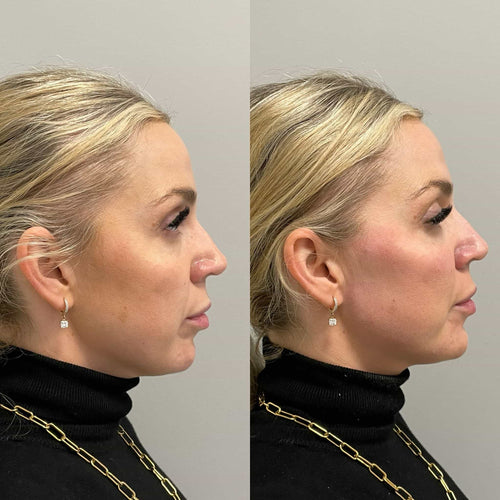Consult with Dr. Laura Geige for Dermal Fillers Now
## Ice Therapy
Ice therapy, also known as cold therapy, is a common and effective method for reducing swelling associated with lip filler injections.
After receiving lip fillers, tiny blood vessels around the injection site can become inflamed, leading to swelling, bruising, and discomfort.
Applying ice packs to the treated area can help constrict these blood vessels, thereby minimizing inflammation and reducing swelling.
The cold temperature also numbs the nerves in the area, providing temporary pain relief.
To apply ice therapy effectively:
wrap a few ice cubes in a thin towel or cloth to protect your skin from direct contact with the cold.
Apply the ice pack to the swollen lip area for 15-20 minutes at a time, several times a day.
Avoid applying ice directly to bare skin, as this can cause irritation and frostbite.
Make sure to take breaks between applications to allow your skin to warm up.
Combining ice therapy with other measures, such as compression bandages, elevation of the head, and over-the-counter pain relievers, can further enhance swelling reduction and promote healing.
Cold Compression
Frozen Food Application
Topical Medications
Lip filler swelling is a common side effect after treatment. It typically peaks within 24-72 hours and gradually resolves over several days to weeks.
While some swelling may be unavoidable, there are steps you can take to minimize it and promote faster healing.
Ice Packs: Applying ice packs to the treated area for 10-15 minutes at a time, several times a day, can help reduce inflammation and numb the area. Wrap the ice pack in a thin towel to avoid direct contact with skin.
Arnica Cream or Gel: Arnica is a natural remedy that has been traditionally used for bruising and swelling. Applying arnica cream or gel topically may help to reduce inflammation.
Elevation: Sleeping with your head slightly elevated can help reduce swelling by promoting drainage.
Hydration: Staying well-hydrated is essential for overall healing. Drink plenty of water throughout the day.
Avoid Certain Activities: For the first few days after treatment, avoid strenuous exercise, excessive sun exposure, and alcohol consumption, as these can increase inflammation.
Over-the-Counter Pain Relievers: Acetaminophen or ibuprofen can help manage any discomfort or pain associated with swelling.
**Note:** If you experience excessive swelling, bruising, or any unusual symptoms, contact your doctor or a qualified medical professional immediately.

It’s important to note that everyone heals differently, and the duration of swelling can vary depending on individual factors.
Following these tips may help minimize swelling and promote faster recovery after lip filler treatment. It’s also essential to consult with a qualified medical professional for personalized advice and care.
Anti-inflammatory Creams
Hydrocortisone Ointment
## Lifestyle Adjustments
Hydrocortisone ointment is a topical corticosteroid that can help reduce inflammation and swelling. It works by suppressing the body’s immune response, which helps to minimize the inflammatory reactions associated with lip filler injections.
Book a Dermal Filler Consultation with Dr. Laura Geige at It’s Me and You Clinic
Applying hydrocortisone ointment to the injected area after lip filler treatment may help minimize post-procedural swelling and bruising. However, it’s important to note that hydrocortisone ointment doesn’t completely eliminate swelling, nor does it replace other recommended treatments and aftercare instructions provided by your injector.
While hydrocortisone ointment can be helpful, always consult with a qualified medical professional for personalized advice regarding lip filler swelling. They can assess your individual situation and recommend the most appropriate treatment plan.
In addition to using hydrocortisone ointment, here are some lifestyle adjustments that may help reduce lip filler swelling:
Cold Compresses: Applying cold compresses or ice packs wrapped in a towel to the injected area for 10-15 minutes at a time can help constrict blood vessels and minimize swelling.
Elevating Your Head: Sleeping with your head elevated can help reduce fluid buildup around your lips.
Hydration: Drinking plenty of water helps flush out toxins and supports the body’s natural healing process.
Avoid Alcohol and Smoking: These habits can dehydrate the skin and worsen swelling.
Gentle Facial Massage: Gently massaging the area around your lips can help improve circulation and reduce puffiness.
Avoid Strenuous Activity: Refrain from vigorous exercise or activities that increase blood flow to the face for a few days after your treatment.
**Eat a Healthy Diet:** Focus on nutrient-rich foods that support skin health and overall well-being.
Book Your Dermal Filler Appointment with Dr. Laura Geige Now
Gentle Massaging
Avoiding Excessive Sun Exposure
Pets R4U Arielle Likes to Cook Decléor Direct Press on Honey Super Sleep Yoga
- Why Can’t You Workout After Lip Filler - November 3, 2025
- What Is The Best Filler For Marionette Lines? - November 2, 2025
- What Are The Alternatives To Nasolabial Fillers? - October 30, 2025
